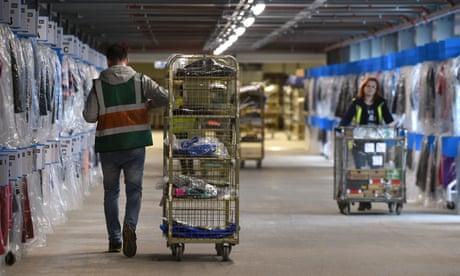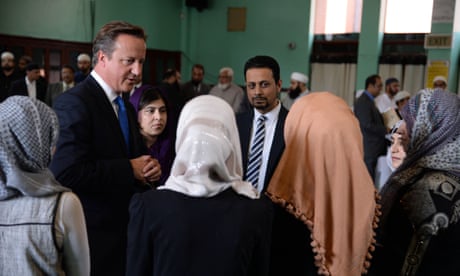
Illustration by Nicola Jennings
I left the Royal Court theatre a few days ago, feeling as though the writer had been rifling through my and other reporters’ notebooks. In Wish List, Katherine Soper has pinned down a theme central to today’s politics – but one I’ve yet to see in print or hear from an MP. To grasp it is to understand much of what drives support for both Brexit and Trump – and just why this is such a hostile climate for the left, be it in the form of Ed Miliband or Jeremy Corbyn, Bernie Sanders or Hillary Clinton.
I left the Royal Court theatre a few days ago, feeling as though the writer had been rifling through my and other reporters’ notebooks. In Wish List, Katherine Soper has pinned down a theme central to today’s politics – but one I’ve yet to see in print or hear from an MP. To grasp it is to understand much of what drives support for both Brexit and Trump – and just why this is such a hostile climate for the left, be it in the form of Ed Miliband or Jeremy Corbyn, Bernie Sanders or Hillary Clinton.

Zero-hours workers '£1,000 worse off a year' than employees
At the centre of the play is a 19-year-old whose life is already over. Tamsin Carmody’s mother has died, leaving her in charge of the family. That means looking after her brother, Dean, who has been almost broken by poor mental health. When things get too much, he’ll press his hand on to a burning hob.
To scrape by, Tamsin works on zero hours in a giant distribution warehouse, packing strawberry lube, Meat Loaf albums, bottles of gin. The grim details of how the 21st-century British labourer has been reduced to cheap commodity are all here: the work boots that leave Tamsin’s feet clenched balls of pain, the countless paper cuts from folding cardboard that never get time to heal, the pleading for more work each morning. Some of this derives from Soper’s own experience. The 25-year-old has done her own zero-hours stint in a packing plant where, after calling in sick for a shift, she turned up the next day only to be ordered home: she had already been replaced.
Then there’s Dean. The government reckons he’s fit for work, despite his inability to face strangers or venture out in daylight. He loses his disability benefits, and has to enact the farce of assembling a CV and applying over and over again for jobs he won’t get and could never hold down.
And here is where a play does what a newspaper can’t and a politician won’t: the siblings’ lives are laid side by side, and the state is revealed to be just as callous, unanswerable and punitive as the employer.

FacebookTwitterPinterest Erin Doherty (Tamsin Carmody) and Joseph Quinn (Dean Carmody) in Wish List. Photograph: Tristram Kenton for the Guardian
Tamsin can’t meet her impossible targets of packing 400 items an hour; Dean is in no state to fill in all his job applications. Tamsin’s boss shrugs that he’s following orders: “They just get the numbers in the red and they work out how to put them in the black.” Dean’s health assessor and welfare adviser are in the pay of a government following a busted austerity strategy that relies on cutting off money to the poor.
Both have to struggle through tick-boxes, euphemistic nonsense (Tamsin’s warehouse is a “fulfilment centre”; Dean’s disabilities make him “fit for work”) and a system that grabs a lot while giving a pittance.
We’re often told that the state and the market have entirely different roles. But meet any number of the people paying the price for Britain’s crash, and you’ll see that they play almost identical parts using similar language and similar bureaucracy. And far from protecting low-paid workers from the depredations of the market, the state wants to hurl more people into it under the pretence that they are shirkers.
None of this fits with how social democrats view the state. Having attended my fair share of Labour and other leftwing political meetings, I know that a staple feature is that some grey-haired man in a jumper will leap up towards the end and launch into a good-hearted defence of the state. Public investment, social security, industrial strategy: all will circle back to the state; all will be met with murmurs of approval.
This has happened without the pundits and politicians noticing
And all are a million miles away from the experiences I regularly hear while reporting. I think about Lisa Chapman in Northamptonshire frantically searching the internet in the small hours to protect the benefits of her husband, who has Parkinson’s. A few days after my trip to the theatre I saw a presentation from the head of a local Citizens Advice. One of the PowerPoint slides read: “For some people, there is no safety net any more.” There was a time, she explained, when if someone walked in penniless she could get on the blower and shout, and scream and get them some money from somewhere. Now? That was almost impossible.
And I think of the valleys of south Wales, and the replies I got when asking what would make things better in one of the poorest parts of western Europe. No one mentioned the government, either in Cardiff or in Westminster. When I mentioned the G-word – in this place, where Thatcher shut the mines while Labour just relied on its voters to carry on being good little sheep – the response was usually laughter.
At the end of 2015, a team of academics held a series of two-day discussions with small groups of members of the public across Europe. They were asked only one big question: what should the government do for your children’s generation? Of all the countries, the British were easily the most pessimistic about what could be done – behind even Slovenia.
The British liked the NHS and pensions, but thought both would be gone in a generation. They didn’t talk about the good things that could be done by government. Trade unions came up just once in the entire two days. “I found it quite shocking,” recalls Peter Taylor-Gooby, of the University of Kent. “Of all the groups we interviewed, the British had this mood of resigned, reluctant individualism.”
Thirty years ago, Ronald Reagan claimed the nine most terrifying in the English language were: “I’m from the government and I’m here to help.” He said it was a joke; it turned out to be a prophecy. Three decades of both right and left privatising, outsourcing and deregulating have shrunk the public imagination about what their representatives in government can achieve. Put that alongside the shattering of the working class, the smashing of trade unions, and the diminishment of so many other social institutions.
The need for the state and collective action hasn’t diminished, but the public belief in it has gone. The state is now either invisible or hostile. This has happened without the pundits and politicians noticing, but its consequences could shape politics for decades.
After Dean has received his latest brown envelope, Tamsin turns to him and begins a vow. “We’re gonna make it without them. OK? Fuck them … we can do this ourselves. We can – I can work, and …” Her voice breaks. “This isn’t fucking fair. I can’t keep doing this. I can’t.
“I’m so fucking tired.”
Both have to struggle through tick-boxes, euphemistic nonsense (Tamsin’s warehouse is a “fulfilment centre”; Dean’s disabilities make him “fit for work”) and a system that grabs a lot while giving a pittance.
We’re often told that the state and the market have entirely different roles. But meet any number of the people paying the price for Britain’s crash, and you’ll see that they play almost identical parts using similar language and similar bureaucracy. And far from protecting low-paid workers from the depredations of the market, the state wants to hurl more people into it under the pretence that they are shirkers.
None of this fits with how social democrats view the state. Having attended my fair share of Labour and other leftwing political meetings, I know that a staple feature is that some grey-haired man in a jumper will leap up towards the end and launch into a good-hearted defence of the state. Public investment, social security, industrial strategy: all will circle back to the state; all will be met with murmurs of approval.
This has happened without the pundits and politicians noticing
And all are a million miles away from the experiences I regularly hear while reporting. I think about Lisa Chapman in Northamptonshire frantically searching the internet in the small hours to protect the benefits of her husband, who has Parkinson’s. A few days after my trip to the theatre I saw a presentation from the head of a local Citizens Advice. One of the PowerPoint slides read: “For some people, there is no safety net any more.” There was a time, she explained, when if someone walked in penniless she could get on the blower and shout, and scream and get them some money from somewhere. Now? That was almost impossible.
And I think of the valleys of south Wales, and the replies I got when asking what would make things better in one of the poorest parts of western Europe. No one mentioned the government, either in Cardiff or in Westminster. When I mentioned the G-word – in this place, where Thatcher shut the mines while Labour just relied on its voters to carry on being good little sheep – the response was usually laughter.
At the end of 2015, a team of academics held a series of two-day discussions with small groups of members of the public across Europe. They were asked only one big question: what should the government do for your children’s generation? Of all the countries, the British were easily the most pessimistic about what could be done – behind even Slovenia.
The British liked the NHS and pensions, but thought both would be gone in a generation. They didn’t talk about the good things that could be done by government. Trade unions came up just once in the entire two days. “I found it quite shocking,” recalls Peter Taylor-Gooby, of the University of Kent. “Of all the groups we interviewed, the British had this mood of resigned, reluctant individualism.”
Thirty years ago, Ronald Reagan claimed the nine most terrifying in the English language were: “I’m from the government and I’m here to help.” He said it was a joke; it turned out to be a prophecy. Three decades of both right and left privatising, outsourcing and deregulating have shrunk the public imagination about what their representatives in government can achieve. Put that alongside the shattering of the working class, the smashing of trade unions, and the diminishment of so many other social institutions.
The need for the state and collective action hasn’t diminished, but the public belief in it has gone. The state is now either invisible or hostile. This has happened without the pundits and politicians noticing, but its consequences could shape politics for decades.
After Dean has received his latest brown envelope, Tamsin turns to him and begins a vow. “We’re gonna make it without them. OK? Fuck them … we can do this ourselves. We can – I can work, and …” Her voice breaks. “This isn’t fucking fair. I can’t keep doing this. I can’t.
“I’m so fucking tired.”
